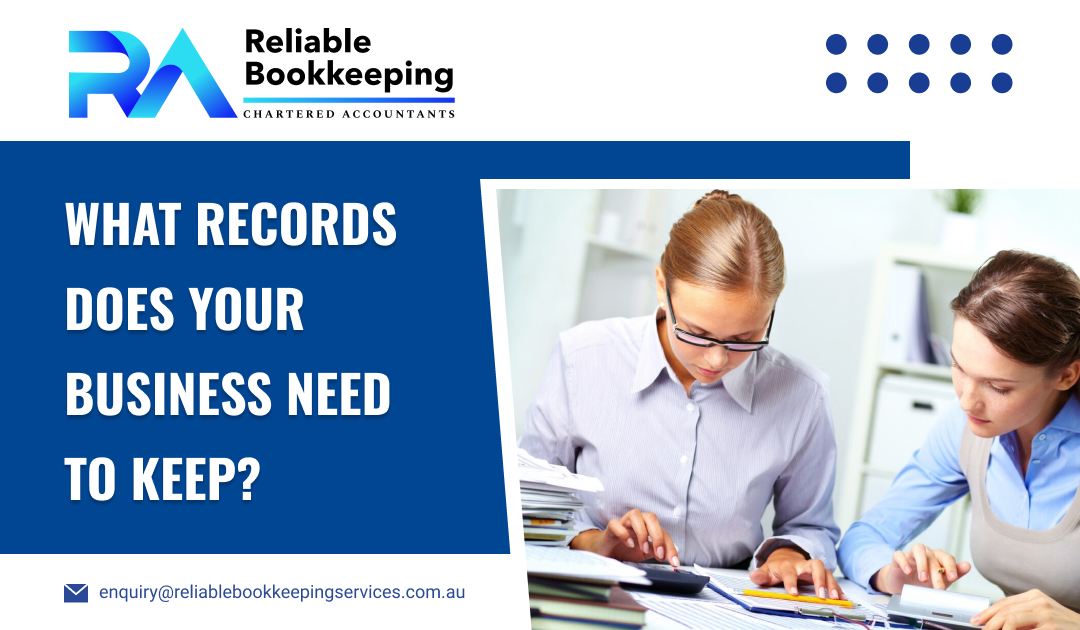For every business, it is vital to keep accurate and complete records. It is also important for anyone in business because it makes it easy to manage cash flow, meet tax obligations, and understand how your business is doing. Let’s delve right in to know what types of records your business needs to keep.
What Does the Law Need?
By law, your records must:
• explain all your financial transactions
• be in writing (paper or electronic)
• be in English or in a form that can be translated easily
• be maintained for 5 years (some records may have to be kept longer).
If you fail to keep the right tax records, you may have to pay financial penalties. This is where bookkeepers of Melbourne can prevent you from paying any type of penalties because make sure that all of your records are accurate and complete.
How to Maintain Records for Small Businesses?
Your bookkeeper can help you keep payment, invoicing, and other business transaction records on paper or electronically. Maintaining records electronically will help you perform daily business activities and meet your super and tax obligations. With the right records, you can:
• automatically calculate sums and generate pre-made reports
• provide income tax and goods and services tax (GST) invoices, summaries, and reports
• stay up-to-date with tax laws and rulings
• submit specific information to the ATO online
• preserve physical storage space
• maintain backup records in case of theft, fire, or flood.
When you intend to get bookkeeping services for small businesses, then you can get their advice on choosing the best bookkeeping system.
Types of Records Businesses Need to Keep
You need to keep records to help you prepare and lodge business activity statements and annual tax returns, and to meet tax obligations. You need to maintain the following records:
• Income and Sales Records
Bookkeepers in Melbourne make sure to keep records of all sales and income transactions, including:
◦ receipt books
◦ tax invoices
◦ cash register tapes
◦ records of cash and digital sales.
• Purchase or Expense Records
Keep records of all business expenses or purchases. They could include:
◦ tax invoices
◦ receipts
◦ cheques book receipts
◦ credit card vouchers
◦ diaries to record small cash expenses.
If you purchased something for your business, but sometimes you use it for private purposes, you need to keep records showing how much of its use is for personal purposes.
• Year-End Records
Keep year-end records, including:
◦ list of debtors (people that owe you money) or creditors (people you owe money to)
◦ expenses you incur maintaining, purchasing, repairing and selling business assets.
You must keep records to calculate the decreasing value of your assets and capital gains tax records.
• Bank Records
Your bank records can include the following things:
◦ deposit slips
◦ payment records
◦ credit card and bank statements
◦ lease or loan agreements.
Your personal and business expenses need to be kept separately if you are a company, partnership or trust. If you are a sole trader, it is important to have a separate business bank account to manage records easily.
• Goods and Services Tax (GST) Records
If you are registered for goods and services tax, you need to keep all tax invoices from your suppliers that will help you claim GST credits. You need to keep any document that has adjustments, a calculation made for GST purposes. You record GST amounts and access GST credits for purchases on your BAS. You can choose bookkeeping and accounting services to stay ahead of tax matters.
• Fuel Tax Credits Records
To claim fuel tax credits for your business, your records need to show you:
◦ acquired the fuel
◦ use of fuel in your business
◦ applied the right rate when calculating how much you can claim
◦ are performing business activities eligible for fuel tax credits.
• Contractor and Employee Records
If you have workers, you need to maintain records of any:
◦ TFN declarations and withholding declaration forms
◦ Allowances, wages, and any other payments you make to them
◦ The tax you withhold from payments you make to your workers
◦ Contributions to their super guarantee
◦ proof that you’ve given each eligible employee a choice of super fund
◦ fringe benefits you offered
◦ contracts.
Conclusion
As a business owner, you need to maintain all of the above-mentioned records. You can seek help from a reliable bookkeeper to manage records on your behalf. Therefore, you can also reach a Reliable Bookkeeping Services provider.
Other Useful Links:-

